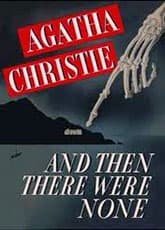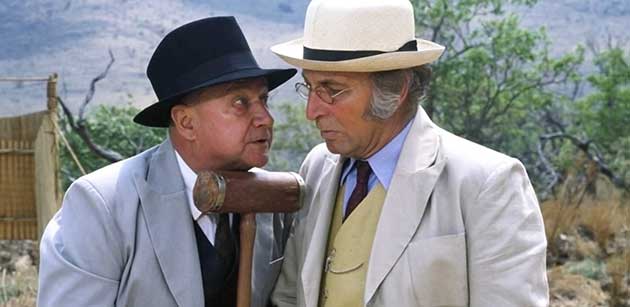And Then There Were None
CRITIQUE | QUOTES | AT THE MOVIES
 First US edition, 1940
First US edition, 1940And Then There Were None
Also called
Ten Little Indians
First publication
1939
Literature form
Novel
Genres
Crime, mystery
Writing language
English
Author's country
England
Length
Approx. 53,500 words

The judge (Donald Pleasance) and the doctor (Yehuda Elfroni) confer in the 1989 film The Little Indians.
Believe it or naught
Ten Little Indians (1989): Director Alan Birkinshaw; writers Jackson Hunsicker, Gerry O'Hara; featuring Donald Pleasence, Brenda Vaccaro, Frank Stallone, Sarah Maur Thorp, Herbert Lom, Yehuda Elfroni
Agatha Christie's novel Ten little Indians, or And Then There Were None, famously takes place on an island off the British coast, but for some reason adapters like to move the location around. A 1965 production stranded the ten in a snowbound mansion on a mountain. A 1974 film places them in an Iranian desert. And this 1989 effort—bizarrely—sends them on an Africa safari.
Not that they do any safari-ing. After they're isolated by natives cutting a bridge across a gorge, they mainly sit around the camp, talking, eating and emoting—as in all the adaptations. The film is supposedly based on Christie's play rather than the novel, which may be why there are so many static set pieces. It also adopts the play's happy ending—happier, that is, than compared to the novels completely bleak ending. This uplift at the resolution, however, is brief and appears to be quickly tacked on to the long tale of woe and vengeance that preceded it.
Still the suspense and mystery are played up nicely in the film, with lots of mildly suspenseful moments and a few shocking scenes—shocking, that is, to anyone who hasn't seen a lot of modern films. This version is credited as the first adaptation to actually show some of the killings. Gory, horror story stuff, though tame by later standards.
The trailer for Ten Little Indians (1989) plays up the early scenes of travelling to the safari camp.
Of course, Christie's story needs to keep moving quickly before people realize how implausible it is, and this version does that, despite having to further struggle against the added implausibility of being stuck in an unconvincing jungle.
The tense personal interaction among the guilty—and possibly vengeful—parties, which make up the bulk of the story, is presented in workmanlike fashion. Given little time to develop their characterizations, the actors do their best with the material, led by the capable Donald Pleasence in his usual malevolent role as the harsh justice, Brenda Vaccaro as an over-the-top actress who had killed her lesbian lover (obviously a change from Christie's original script), and Herbert Lom as the befuddled ex-general. Christopher Lee is uncredited as the voice of the absent Mr. Owen on the phonograph record.
The characters we are meant to most sympathize with, the two youngest, though are played by the underwhelming Frank Stallone (Sylvester Stallone's singing brother) and the classically trained but little-known Sarah Maur Thorp.
Straightforward direction with decent, though not outstanding, production values make this film quite watchable, if you can keep your incredulity in check.
— Eric


